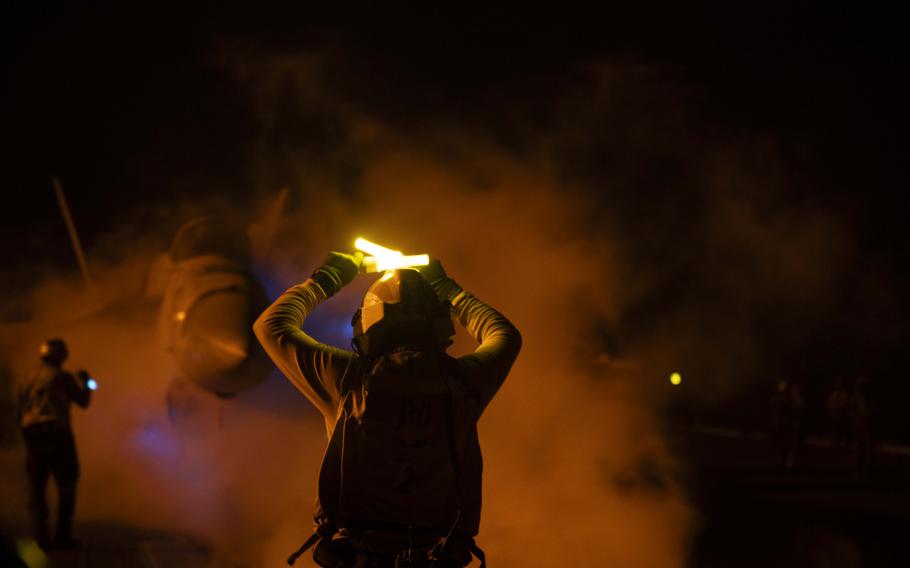
USS Dwight D. Eisenhower conducts flight operations on Jan. 22, 2024, in response to increased attacks from Iran-backed Houthi rebels in Yemen on the shipping lanes of the Red Sea. (Kaitlin Watt/U.S. Navy)
WASHINGTON — Lawmakers are at odds on how the U.S. should respond to an Iran-backed drone attack in Jordan that killed three U.S. soldiers this week, with some urging restraint and others calling for forceful action.
“I urge President [Joe] Biden to proceed thoughtfully and carefully with a strategic, proportional response that avoids unnecessary escalation,” said Rep. Sara Jacobs, D-Calif., a member of the House Armed Services Committee.
“No more weak, ‘proportionate’ responses. Weakness invites aggression and escalation,” said Rep. Dan Crenshaw, R-Texas, a former Navy SEAL. “Time to kill another Iranian general, perhaps? That might send the right message.”
Biden has vowed to “hold all those responsible to account at a time and in a manner our choosing” and said Tuesday that he had decided on a response to the deadliest attack on American forces since the killing of 13 troops during the U.S. withdrawal from Afghanistan.
He blamed Iran for arming the militants that carried out the Sunday attack, as well as more than 160 others throughout the Middle East in recent months, but said he did not want to see the U.S. embroiled in a wider war in the region.
“That’s not what I’m looking for,” Biden said.
That caution is also being expressed by Democrats, who said the U.S. must find a way to retaliate without further inflaming tensions.
“We must be strategic in our actions as these militants are actively seeking to pull the United States into a larger regional conflict,” said Rep. Andy Kim, D-N.J., another member of the House’s Armed Services Committee.
The Middle East has been on edge since more than 1,000 Israelis were killed by Hamas militants in October and Israel invaded the Gaza Strip in response.
The conflict has prompted Houthi rebels in Yemen to target commercial shipping in the Red Sea and led to at least 165 attacks on U.S. forces throughout the region, including 98 in Syria, 66 in Iraq and the latest strike on a military outpost in Jordan.
About 80 troops have been injured in the attacks, according to U.S. officials. Two Navy SEALs died this month during an operation in the Arabian Sea to interdict Iranian weapons to the Houthis.
U.S. forces have been launching airstrikes against the group since mid-January.
Rep. Adam Smith of Washington, the top Democrat on the House Armed Services Committee, acknowledged hostilities in the region have spiraled into a wider war but warned that it can always become wider still.
He said the U.S. needs to “go more directly” after Iran and disrupt the flow of missiles, drones and other weapons that the country is funneling to militant groups. The targets could be either inside Iran or elsewhere, but they must be considered, he said in a CNN interview.
“The calculus right now is just not in our favor,” Smith said. “Iran is allowing these attacks to happen with no consequences to themselves. As long as that continues, the attacks will continue and our service members will be at risk, and that can’t be tolerated. We’ve got to change Iran’s calculus and have them bear some of the cost of what they’re doing.”
Some Republicans have called for direct strikes on Iran, with Sen. Lindsey Graham, R-S.C., proclaiming: “Hit Iran now. Hit them hard.”
Sen. Tom Cotton, R-Ark., a member of the Senate Armed Services Committee and an Army veteran, said the only answer to the Jordan attack must be “devastating military retaliation against Iran’s terrorist forces, both in Iran and across the Middle East.”
The top Republican on the committee, Sen. Roger Wicker, R-Miss., demanded direct strikes against Iranian targets and Iranian leadership.
“It’s time to act swiftly and decisively for the whole world to see,” he said.
Calls for strike targets inside Iran are limited, but they have renewed concerns from lawmakers who want to reassert congressional war powers as the U.S. gets further enmeshed in military actions in the region.
Sen. Mike Lee, R-Utah, said Congress must weigh in on any war decisions.
“There is no ‘Iran is bad’ exception to the Constitution,” he wrote in a response to Graham on X, formerly Twitter. “If we’re going to war, Congress must declare it.”
Rep. Thomas Massie, R-Ky., agreed, writing: “Bombing Iran would require an act of Congress according to the Constitution.”
A bipartisan group of lawmakers from the House and Senate pressed the White House last week to seek authorization from Congress before launching additional strikes against the Houthis in Yemen.
John Kirby, a spokesman for the White House National Security Council, on Monday defended Biden’s legal right to respond to the Jordan drone attack without approval from Congress.
“The president has the authority to take the action he needs to protect our troops and our facilities overseas under Article 2 of the Constitution,” which establishes the president as the commander in chief of the military and gives him authority to protect troops, Kirby said.
Congress last signed off on an authorization for the use of military force in 2002 for the Iraq War. In 2001, lawmakers gave the president sweeping powers to use force against “all nations, organizations or persons” involved in the 9/11 terrorist attacks.
Presidents have leaned on both authorizations to legitimize military engagements overseas, particularly in the Middle East. Senators last year voted to repeal the Iraq War authorization, but the effort stalled in the House.